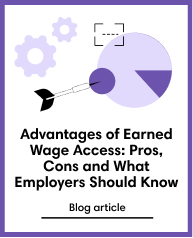Earned Wage Access
Jan 5, 2022
Is Earned Wage Access (EWA) The Superstar Employee Benefit?
Subscribe to our newsletter
For many years, employers offered various employee benefits to attract quality talents and retain them. When the COVID-19 pandemic spread across the world, employee benefits held a bigger role in organisations that offer them. Aside from healthcare, employees have also been prioritizing their financial wellbeing over the past year, given that the pandemic has caused financial stress for many.
According to financial services company Northwestern Mutual, the pandemic has pushed people to reconsider their approach to financial planning. In fact, 83% of Americans created, revisited, or adjusted their financial plan during the pandemic, while 95% said they expect to follow the new financial habits that they picked up since last year. Some of these new habits include reducing living costs, paying down debt, and increasing their retirement savings and contributions. By following these practices, these people are able to improve their financial wellbeing even during an economic crisis.
Achieving financial wellness has become more important than ever and it is time for employers to realise that this is something that they can help their employees with. One employee benefit that both employers and employees can benefit from alongside medical insurance is earned wage access.
Let us take a look at why companies should start offering EWA as a priority benefit for their employees.
Financial security
Past research from Willis Towers Watson showed that money concerns lead employees to lose 12.4 days of productivity due to presenteeism, which is the state at which employees are physically present at work but mentally absent because they are dealing with illnesses or severe stress. Presenteeism accounts for more lost time than days when employees are fully absent from work.
The findings from the study are not far from what employees experience nowadays, especially as the world continues to feel the post-pandemic economic effects. However, there is proof that financial wellness benefits help employees resolve at least some of their personal problems. A 2021 survey by SHRM revealed that employees used benefits such as emergency savings funds, financial planning, and financial coaching more than any other financial wellness benefit since the start of the pandemic.
By adding EWA into the picture, employees would have a better chance of managing their daily finances, weathering the pandemic, and financially preparing themselves for future crises. EWA also protects employees from payday loans and overdrafts on their bank accounts, which may lead them to pay expensive fees.
Job security
When employees are able to improve their finances and ultimately their lives, they would most likely want to stay in places where that opportunity is given. Thus, employees are more likely to stay in their jobs if their employers offer an EWA program that could help improve their financial stability. EWA would also help them focus on their current jobs instead of seeking greener pastures.
On the other side of the coin, employers are able to save on hiring costs thanks to EWA. Research shows that the cost to hire an employee is around a fifth of their yearly salary, which makes it all the more crucial to minimise employee turnover.
Easy integration with existing systems
On the technical side of things, some employers may have the misconception that getting an EWA provider means they have to access another system on top of their existing workforce management programs. The reality is that employers can partner with an EWA provider that offers API integration with payroll and HR management systems so that employee wages can easily be computed and become available to them when they need money.
Take the example of fintech company Revolut’s Payday, which can be integrated into existing payroll systems. This feature allows employers to streamline their financial processes and minimise errors and delays on requests for EWA.
Employers should still take note that having an EWA program may not always be sunshine and rainbows. Employers should still teach their employees to better manage their finances instead of solely relying on EWA products, abusing their organisation’s systems, or getting themselves into more financial trouble. Moreover, choosing the right EWA makes all the difference in an organisation; the wrong EWA provider may lead employers to pay the cost of implementing and running the solution as it may not be fit for their needs.
Overall, employees can better take care of their employees if they offer EWA as a priority benefit. Additionally, financial education is key to protecting employees from debt cycles and employers from high fees. When employers choose the right EWA provider for their organisation, they also help employees access more financial products and services like credit and loans. On that end, credolab uses alternative data to enable its fintech credit scoring solution and allow lenders to better assess borrowers. Many financial institutions already use alternative data sources that were previously not analyzed to improve their business operations. Alternative data has also been helpful in improving the credit reports of credit invisibles and lowering interest rates for borrowers.
With alternative data, credolab can also help lenders improve their credit risk management practices so that they can better protect themselves from borrowers who may possibly default.
Credolab provides an extensive discussion on EWA and how embedded financial services make it possible for digital lenders to provide EWA through affordable and fast APIs and integrations. Download our eBook here.




